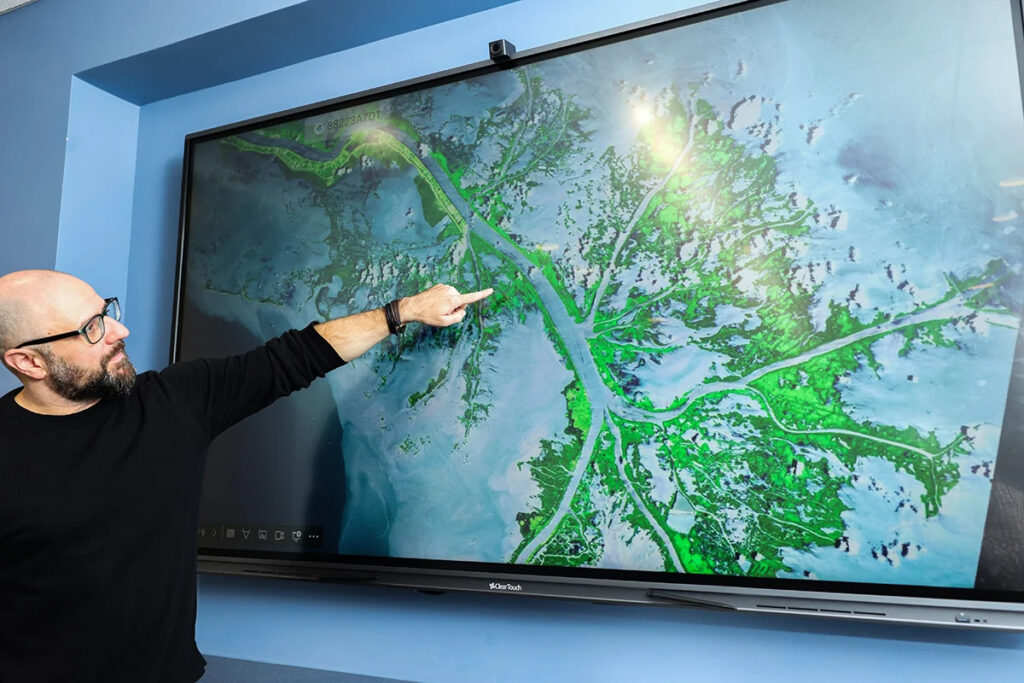By Brianna Jesionowski, UCF News
The University of Central Florida is part of a new $22 million project to help understand the future of the Mississippi River delta and ways to combat land and ecological losses.
The work is through a five-year grant awarded to the Gulf Research Program of the National Academies of Sciences, Engineering, and Medicine in order to fund their project, titled the Mississippi River Delta Transition Initiative (MissDelta).
The project is focused on the lowermost part of the Mississippi River Delta, also known as the Birdsfoot, where the bed of the river is so far under sea level that it is changing the directions of water flow and is struggling to push back against the seawater coming in from the Gulf.
The work was started by Louisiana State University and Tulane University, which recently expanded their team to experts around other Gulf states, one of which is Thomas Wahl, an associate professor in UCF’s Department of Civil, Environmental and Construction Engineering, and member of UCF Costal: National Center for Integrated Coastal Research.
“I have been successfully collaborating with colleagues at Tulane for a while,” Wahl says. “So, when this proposal was developed and they were interested in expanding the team to add certain expertise and have universities from other Gulf states involved, they approached me and that is how I became a member of the team.”

Wahl says the main goals for the MissDelta project are to collect data on the coastal water levels and ocean waves inside of the Birdsfoot region of the Mississippi River and use that data to analyze the extreme storm surges and wave events.
They are also employing machine learning to create models that expand their database and help predict potential changes for future storm surge climates and the ongoing sea-level rise.
They are also collaborating with partners to develop input data for all the models, including assessing sediment transportation and physical changes and modeling flood impact. They are also inputting rainfall, river flow, coastal sea-level rise and storm surge data.
Along with UCF, LSU and Tulane, there are 11 other universities involved with the project including the University of Southern Mississippi, University of Louisiana at Lafayette, Louisiana Universities Marine Consortium, Southern University of Baton Rouge, Xavier University of New Orleans, Jackson State University, Grambling State University, Dillard University, Alcorn State University, Water Institute of the Gulf, and the College of William & Mary.
Additional collaboration
Wahl is also working with Tulane on a $3.2 million project to assess how sea-level rise combined with storm surges will impact more than 1,800 military installations worldwide. The work is through the U.S. Department of Defense (DoD) Strategic Environmental Research and Development Program (SERDP), and Tulane is the lead institution.
The team’s goal is to obtain consistent, observational sea level data for military installations worldwide by merging newly recovered tide gauge data and a variety of different geophysical ocean and Earth models in a hybrid modeling approach, which will support DoD’s coastal sea level database.
They aim to have at least 60 years of data at every location for determining sea-level related hazards, and thus provide stakeholders with more accurate and robust information about historical sea-level change at any given site worldwide.
This project also includes scientists from Virgina Tech and California Polytechnic State University.
Researcher credentials
Wahl is an associate professor of Civil, Environmental and Construction Engineering with the College of Engineering and Computer Science. He received his Diploma and Ph.D of Civil Engineering from the University of Siegen, Germany. His research connects civil/coastal engineering with science such as oceanography and climatology in order to understand how coastal communities, structures and ecosystems are vulnerable to climate change. His focus is on the changes of sea levels, ocean waves and freshwater flows in order to develop sustainable adaptation strategies.
This piece was originally published at https://www.ucf.edu/news/ucf-expertise-tapped-to-help-combat-land-ecological-losses-in-mississippi-river-delta/.
Sign up for The Invading Sea newsletter by visiting here. If you are interested in submitting an opinion piece to The Invading Sea, email Editor Nathan Crabbe at ncrabbe@fau.edu.



